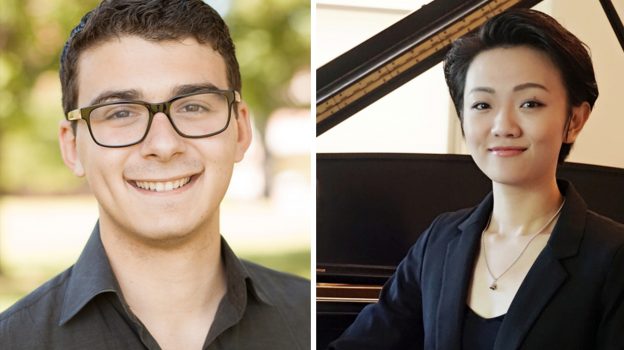American Composers Orchestra (ACO) announces two commission awards for emerging composers Paul Novak and Dai Wei. They were chosen from six participants in ACO’s 29th Underwood New Music Readings, one of the most coveted opportunities for emerging composers in the United States. Paul Novak receives the 2020 Underwood Commission while the CANOA (Composing a New Orchestra Audience) Consortium for Emerging Composers Commission goes to Dai Wei.
Amidst concerns of the spread of COVID-19, and at the request of the City College of New York, the Readings on March 12 and 13, 2020 were closed to the public and open only to orchestra musicians, composers, and staff. ACO President Ed Yim reflects, “We were, of course, gratified that ACO was able to complete this year’s Underwood New Music Readings just before this period of self-isolation had to begin. And now, to be able to look towards the future with this announcement – to a time when we can gather again and make music for audiences – is uplifting.”
Underwood Commission recipient Paul Novak will write a new work to be performed by ACO in a future season. Novak says, “I had a truly magical experience at the Underwood Readings; working with ACO as they brought six new works to life, I could sense their passion for and commitment to the music of our time. I’m so honored to have received this new commission, and I’m looking forward to collaborating again with this fantastic and forward-thinking ensemble!”
Mentor composer Melinda Wagner says, “We were all impressed with Paul Novak’s exquisitely constructed piece—the patient bloom of colors, skittering textures, and whimsical clouds of sound. I am very excited about Paul’s Underwood Commission, and I look forward to hearing his new work for ACO.”
The CANOA Consortium Commission for Emerging Composers was created as a way to involve more orchestras in supporting emerging composers and as a way to meet the challenge of going beyond the first performance of a work. By embedding repeat performances into the design of the commission (an opportunity rare for emerging composers), the CANOA Consortium Commission is funded with the generous support of Elizabeth and Justus Schlichting.
“We love symphonic music,” said the Schlichtings. “CANOA was created to help sustain an art form we care very much about. It is based on the idea that bringing new compositions to the repertoire is essential to orchestral life. A key part of CANOA is to support programs that provide talented composers with better ways to develop their orchestral writing skills, and have their work performed. Which is exactly what the Consortium for Emerging Composers provides. We are thrilled to support Dai Wei and look forward to hearing what she creates.”
The consortium commission partners and performance season dates will be announced at a later time.
“Dai Wei’s music spoke in a clear and vibrant voice—with orchestral flair, drama, and a mystical lyricism entirely its own.”,” says ACO Artistic Director Derek Bermel. Dai Wei states, “It felt so unreal to me the moment that I found out I received the commission. I am so fortunate to be part of this amazing program that embraces new music and gives opportunities to diverse composers.”
About the Selected Composers and Their Music
Paul Novak (b. 1998) – as the light begins to drift for chamber orchestra
Paul Novak writes music that is lyrical but fragmented, exploring the subtleties of instrumental color and drawing influence from literature, art, and poetry. Read More
Originally from Reno, NV, Novak is an undergraduate student at Rice University’s Shepherd School of Music, where he has studied with Kurt Stallman, Pierre Jalbert, Anthony Brandt, and Karim Al-Zand. Upcoming projects in Spring 2020 include a commission from the Texas New Music Ensemble, a soprano/contrabass duo for LIGAMENT, and work for viola and ensemble for violist Sebastian Stefanovic. www.paulnovakmusic.com.
Of his piece as the light begins to drift, Novak writes, “As a student at Rice, I’ve become familiar with the unusual and beautiful cloud formations that appear in East Texas skies. as the light begins to drift was inspired by their subtle interplay of light and shadow and their flowing, hazy geometries. The work opens with a burst of swirling texture, with spiraling runs and swells entangling in a chaotic sound world. The brass interjects with jagged, syncopated hits as different instruments emerge from and then vanish into the ensemble. After a spiraling downward run, a plaintive English horn melody is accompanied by a canopy of string harmonics and trills. In the second section, crystalline percussion instruments merge with subtle orchestral textures. A clarinet solo leads into a pulsing triplet ostinato, which is passed throughout the ensemble, growing in intensity until it reaches a furious climax. The work closes gently with the return of the English horn, fading to nothing in a halo of shimmering sounds.”
Dai Wei (b. 1989) – Saṃsāric Dance
Dai Wei is originally from China. Her musical journey navigates in the spaces between east and west, classical and pop, electronic and acoustic, innovation and tradition. Read More She recently served as Young Artist Composer-in-Residence at Music from Angel Fire and Composer Fellow at Intimacy of Creativity in Hong Kong. She has received commissions and collaborations with Utah Symphony Orchestra, Chamber Orchestra of Philadelphia, Bang on a Can, Curtis 20/21 Ensemble, Merz Trio, and the Rock School of Ballet in Philadelphia. Her compositions were broadcast by WHYY, Performance Today, Radio Television Hong Kong, and Qinghai Television.
Wei is currently pursuing a doctorate in composition at Princeton University as a Naumburg Doctoral Fellow. She is working on a piece called Partial Men for string quartet, live electronics, and voice where she will perform with Aizuri String Quartet. The piece is dedicated to two deceased men who donated their kidneys to her mother, and to many other deceased organ donors who extended other people’s lives. www.daiweicomposer.com. Of her piece Saṃsāric Dance, she writes, “The piece was inspired by a book I was reading called The Tibetan Book of Living and Dying, which is written by Sogyal Rinpoche. He says, ‘The successive existences in a series of rebirths are not like the pearls in a pearl necklace, held together by a string, the “soul,” which passes through all the pearls; rather they are like dice piled one on top of the other. Each die is separate, but it supports the one above it, with which it is functionally connected. Between the dice there is no identity, but conditionality.’ The title comes from the Sanskrit word Samsara, which is defined as the endless cycle of birth, death, and rebirth. There are three different characters who represent three different lifetimes. They are being reincarnated and intersected by each other and more. It’s like a musical hotpot filled with diverse ingredients, and diversity is something we have since day one in our history. At the end of the piece, the orchestra evolves into only one pitch which represents the oneness of everything. As if we can finally rest. And yet, another journey is just about to start.”
The Underwood New Music Readings and Commission are made possible with lead support from Mr. and Mrs. Paul Underwood.
The CANOA Consortium Commission for Emerging Composers is funded by Elizabeth and Justus Schlichting.
Additional support for ACO Readings comes from The Andrew W. Mellon Foundation, Fromm Foundation, The Aaron Copland Fund for Music, Alice M. Ditson Fund of Columbia University, and the League of American Orchestras with support of the Virginia B. Toulmin Foundation. Public funds are provided by the New York City Department of Cultural Affairs in partnership with the City Council, and the New York State Council on the Arts with the support of Governor Andrew M. Cuomo and the New York State Legislature.


